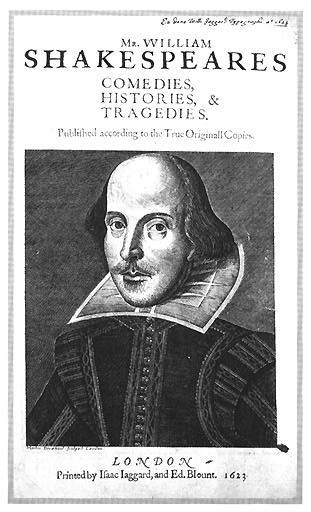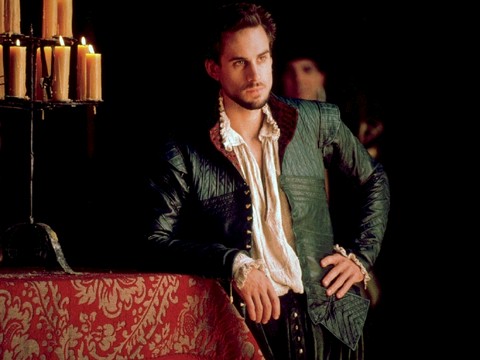| Q & A - Putting Genius in Its Place
Tom Stoppard and writer Marc Norman took the Bard off
his pedestal so they could put him back on top of it.
 With
long hair curling, Oscar Wilde-like, over his collar, playwright Tom Stoppard
enters the sleek dining room of a midtown hotel, an otherworldly presence
in the midst of Manhattan bustle.Stoppard talked about taking on Shakespeare,
the difference between theater and film, and how the movie's themes related
to his own career. Norman joined the conversation midway through the interview. With
long hair curling, Oscar Wilde-like, over his collar, playwright Tom Stoppard
enters the sleek dining room of a midtown hotel, an otherworldly presence
in the midst of Manhattan bustle.Stoppard talked about taking on Shakespeare,
the difference between theater and film, and how the movie's themes related
to his own career. Norman joined the conversation midway through the interview.
Q: Were you daunted at all by taking on such an
iconic figure as Shakespeare?
A: Marc had broken the ice. He'd invented this
very charming story, so it was much easier to just ignore what posterity
had made of him and just deal with him as a young man. What would be daunting
would be to attempt to write him as he existed in the popular imagination.
You wouldn't be able to lay a glove on him, he'd be so special, you wouldn't
know how to begin. At the same time, the thing that makes life easier for
someone writing fiction about Shakespeare is that there are very few signposts,
very few agreed upon facts and lots of spaces to invent. Some of the film
is pure mischief. But then again, you're riding on the back of the most
famous love story ever written, so there are lots of strands to work with.
Q: Still Shakespeare, just as a word, resonates
so much that you figure one would have to deal with audience preconceptions,
particularly in a movie with a title like "Shakespeare in Love."
A: Well, it sounds as though it has to be an intensely
poetical experience for everybody. In fact, it's a nonconventional romantic
comedy. You're writing about an historical figure already, you're in a
situation where the love story can't end in a conventional hearts and flowers
way. It's not 'Sleepless in Stratford.' "There's a limit to what you
can invent. At the beginning, there were moments when the challenge became,
How does Shakespeare speak when he's just speaking to a friend?: Does he
sound like Shakespeare? Does he sound as though he's going to be Shakespeare,
or does he sound like anybody else?
Q: How did you resolve that?
A: Well, in the opening scene, I gave him a line
of verse as his first line of dialogue, a quotation from "Hamlet,"
I think, "Doubt thou the stars are fire, doubt that the earth doth
move. . . . " To which Henslowe [the producer] says, "We haven't
got time for that, talk in prose." I felt that got us through the
gate.
 Joe Fiennes as a young Shakespeare
Joe Fiennes as a young Shakespeare
Q: It seemed at times that you were sending up
all those Hollywood movies showing the genius at work--Kirk Douglas as
Vincent Van Gogh in "Lust for Life," or Charlton Heston as Michelangelo
in "The Agony and the Ecstasy."
A: Well, yes, that makes it look very self-conscious,
that way at looking at genius. "Shakespeare in Love" takes a
very skeptical view of the genius at home. . . . Those movies reinforce
the clichés, the agony and ecstasy of it. The thing I like about
our movie is that it's also the agony and the ecstasy but without the quote
marks. It's a comedy.
Q: Did you do much research before you started
writing?
A: I did read two or three of the studies on Shakespeare's
life and work, and particularly I read up on the situation of the theater
owners and buildings in London. Extraordinarily enough, just when I encountered
this story, they discovered the foundations of the Rose Theatre in London
[where Shakespeare's early plays were presented], and I went to look at
them. There's now an office building on top and around, but they found
the foundations. It's quite amazing to go down there and see the scale
of it.
Q: One of the central questions in "Shakespeare
in Love" is posed by Judi Dench as Queen Elizabeth I, who asks whether
a play can capture the true nature of love. What's your opinion?
A: I think that's a legitimate question about what
theater is, and what it tries to be and I think that theater on every level
has this potential, this capacity to transcend fiction and speak to you
in the audience at a very deep level. That's true of theater whether it's
"Charley's Aunt" or "Oedipus Rex". So the answer is
yes, it can deliver the true emotion because we've all had these experiences.
That's why it's survived, presumably, all these thousands of years, and
it looks now, after a century of movies nearly, that it looks as though
movies can't replace something that theater does. That's what this movie
is saying.
Q: The film's filled with seemingly anachronistic
jokes intended to show the timeless hustle of theater. How accurate are
the parallels between Elizabethan theater and modern Hollywood?
Norman: Elizabethan drama reminds me of the early
days of movies, a bunch of guys holding this tiger by the tail, the tiger
of popular entertainment. The idea of theaters, a place were people would
actually pay for a ticket as opposed to throwing money in a basket for
street buskers, was a radical and revolutionary idea. I did a lot of research
and I came across a lawsuit, in 1610, in which an English company sued
a writer for not writing the three plays he was contracted to write. His
excuse was the plague, and the company argued back, "That's no excuse.'
Attached to the lawsuit was a copy of his contract: He had to turn in three
plays, he had to be available for rewrites on other plays, he had to be
available to write insert jokes, songs, prologues and epilogues, etc. I
told my wife, "Hell, I signed this contract last year with Disney!"
Read
the full interview here.
|
|